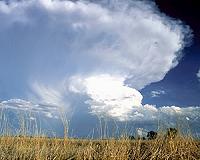| . |  |
. |
Washington DC (SPX) Apr 01, 2011 Despite much research that demonstrates potential dangers from climate change, public concern has not been increasing. One theory is that this is because the public is not intimately familiar with the nature of the climate uncertainties being discussed. "A major challenge facing climate scientists is explaining to non-specialists the risks and uncertainties surrounding potential" climate change, says a new Perspectives piece published in the science journal Nature Climate Change. The article attempts to identify communications strategies needed to improve layman understanding of climate science. "Few citizens or political leaders understand the underlying science well enough to evaluate climate-related proposals and controversies," the authors write, at first appearing to support the idea of specialized knowledge--that only climate scientists can understand climate research. But, author Baruch Fischhoff quickly dispels the notion. "The goal of science communication should be to help people understand the state of the science," he says, "relevant to the decisions that they face in their private and public lives." Fischhoff, a social and decision scientist at Carnegie Mellon University in Pittsburgh and Nick Pidgeon, an environmental psychologist at Cardiff University in the United Kingdom wrote the article together, titled, "The role of social and decision sciences in communicating uncertain climate risks." Fischhoff and Pidgeon argue that science communication should give the public tools that will allow them to understand the uncertainties and disagreements that often underlie scientific discussion. He says that understanding is more likely to happen when people know something about the process that produces the conflicts they hear about in the press. "Communications about climate science, or any other science, should embrace the same scientific standards as the science that they are communicating," says Fischhoff. He says this is crucial to maintaining people's trust in scientific expertise. "When people lack expertise, they turn to trusted sources to interpret the evidence for them," Fischhoff says. "When those trusted sources are wrong, then people are misled." Fischhoff and Pidgeon propose a communications strategy that applies "the best available communications science to convey the best available climate science." The strategy focuses on identifying, disclosing and when necessary reframing climate risks and uncertainties so the lay public can understand them easily. "All of our climate-related options have uncertainties, regarding health, economics, ecosystems, and international stability, among other things," says Fischhoff. "It's important to know what gambles we're taking if, for example, we ignore climate issues altogether or create strong incentives for making our lives less energy intensive." Key to effective communications is what the authors call "strategic organization" and "strategic listening." Strategic organization involves working in cross-disciplinary teams that include, at a minimum, climate scientists, decision scientists, social and communications specialists and other experts. Strategic listening encourages climate scientists, who often have little direct contact with the public, to overcome flawed intuitions of how well they communicate. Strategic listening asks scientists to go beyond intuitive feeling and consider how well they communicate by using systematic feedback and empirical evaluation. "I think that it is good for scientists to be in contact with the public, so that they can learn about its concerns and see how well, or poorly, they are communicating their knowledge," says Fischhoff. "That way they can do a better job of producing and conveying the science that people need."
Share This Article With Planet Earth
Related Links National Science Foundation Climate Science News - Modeling, Mitigation Adaptation
 Climate Talks: Storm Clouds Ahead
Climate Talks: Storm Clouds AheadNew York NY (SPX) Mar 31, 2011 When thousands of ministers, scientists and activists descended on the Mexican resort town of Cancun for another gruelling round of talks on climate change last December, there was little of the debate about the science of global warming that marked the chaotic 2009 meeting. The weather had seen to that. From scorching heat and wildfires in Russia to droughts in Australia, floods in Pakist ... read more |
|
| The content herein, unless otherwise known to be public domain, are Copyright 1995-2010 - SpaceDaily. AFP and UPI Wire Stories are copyright Agence France-Presse and United Press International. ESA Portal Reports are copyright European Space Agency. All NASA sourced material is public domain. Additional copyrights may apply in whole or part to other bona fide parties. Advertising does not imply endorsement,agreement or approval of any opinions, statements or information provided by SpaceDaily on any Web page published or hosted by SpaceDaily. Privacy Statement |